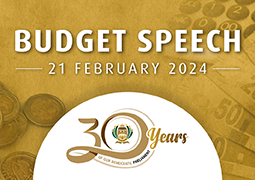
The Minister of Finance, Mr Enoch Godongwana, presented the 2024 budget to the National Assembly yesterday. Referring to the local and global economic outlook, he said global growth is forecast to increase, from 3.1 per cent this year to 3.2 per cent in 2025. In effect, he said, the size of the pie is not growing fast enough to meet South Africa’s developmental needs.
Nonetheless, the moderate improvement is due to growth in the United States’ economy and those of several large emerging economies. However, risks lurk in potential spikes in the global oil price, if the conflict in the Middle East escalates, and if growth falters in China – South Africa’s largest trade partner.
Significantly, the Minister announced that the government has taken the decision to introduce a reform of the Gold and Foreign Exchange Contingency Reserve Account. This will reduce the government’s borrowing costs, from R457.7 billion in 2024/25 to R428.5 billion in 2026/27. The deficit will begin to improve from 2024/25, to an estimated 4.5 per cent of gross domestic product (GDP), reaching 3.3 per cent by 2026/27. Debt will now peak at 75.3 per cent of GDP in 2025/26.
On the domestic outlook, Mr Godongwana said South Africa’s near-term growth remains hamstrung by lower commodity prices and structural constraints. “We estimate real GDP growth of 0.6 per cent in 2023. This is down from 0.8 per cent growth estimated during the 2023 MTBPS [Medium-Term Budget Policy Statement]. The revision is due to weaker-than-expected outcomes in the third quarter of 2023, particularly in household consumption and fixed investment,” he said.
Between 2024 and 2026, growth is projected to average 1.6 per cent. The growth outlook is supported by the expected easing of power cuts as new energy projects begin production, and as lower inflation supports household consumption and credit extension. However, risks to the domestic outlook include persistent constraints in electricity supply, freight rail and ports; and a high sovereign credit risk.
As for the budget deficit, Mr Godongwana said that compared to a year ago, the budget deficit for 2023/24 is estimated to worsen from 4 per cent to 4.9 per cent of GDP. The higher budget deficit means that debt-service costs in 2023/24 have been revised higher, by R15.7 billion to R356 billion. These debt-service costs will absorb more than 20 per cent of revenue. To put this into perspective, spending on debt-service costs is greater than the budgets of social protection, health, or peace and security.
On the plus side, the Minister said: “We are strengthening our strategy and sticking to our fiscal goals.” A net reduction of R80.6 billion in non-interest expenditure is being implemented over the medium-term. At the same time, revenue has been revised up by R45.6 billion over the medium-term, relative to the 2023 MTBPS.
Every year, the Budget Speech is accompanied by several money Bills that must be passed by Parliament for the policy announcements in the Budget to be passed into law. In 2024, these include the 2024 Division of Revenue Bill; the 2024 Appropriation Bill; the Estimates of National Expenditure; the 2024 Budget Review; the 2024 Fiscal Framework; the Second Adjustments Appropriation Bill; and the Gold and Foreign Exchange Contingency Reserve Account Adjustment Bill.
Mava Lukani
22 February 2024

